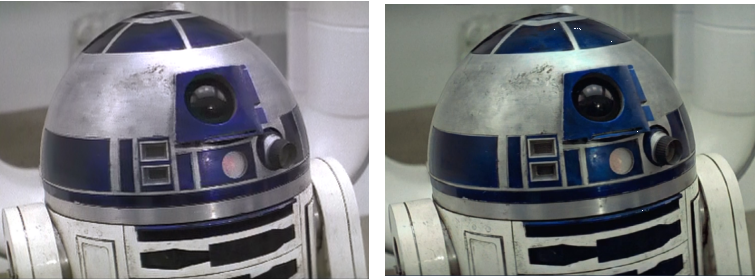I can think of two specific possible cases-
Amadeus- the original edition hasn't been released on BR, the "director's cut" has. The problem is the additions made to the DC don't necessarily improve the film itself. So the question becomes do you take the better version of the film with worse A/V quality, or the better quality but worse story?
Interview with the Vampire- I was intending to at least wishlist the BR version of this on Amazon until I heard that the special edition DVD cut of the film actually had a better audio track. That was the end of that.
In general I only buy BR at this point unless no BR copy is available. I've got a 50" plasma tv, and while the quality difference between BR and DVD isn't severe, it is noticeable, especially if the source material wasn't necessarily pristine to begin with.
BTW, for those who have issues with double-dipping, I recommend http://camelcamelcamel.com You can set up a wishlist on Amazon and then import it into that website, which will then track pricing on items for you, optionally alert you when items drop below target prices you specify, and let you view pricing histories for items. I regard it as the biggest mixed blessing/curse I've run into this year, as it's great to know when items become more affordable, but it's probably done horrible things to my spending habits.
Amadeus- the original edition hasn't been released on BR, the "director's cut" has. The problem is the additions made to the DC don't necessarily improve the film itself. So the question becomes do you take the better version of the film with worse A/V quality, or the better quality but worse story?
Interview with the Vampire- I was intending to at least wishlist the BR version of this on Amazon until I heard that the special edition DVD cut of the film actually had a better audio track. That was the end of that.
In general I only buy BR at this point unless no BR copy is available. I've got a 50" plasma tv, and while the quality difference between BR and DVD isn't severe, it is noticeable, especially if the source material wasn't necessarily pristine to begin with.
BTW, for those who have issues with double-dipping, I recommend http://camelcamelcamel.com You can set up a wishlist on Amazon and then import it into that website, which will then track pricing on items for you, optionally alert you when items drop below target prices you specify, and let you view pricing histories for items. I regard it as the biggest mixed blessing/curse I've run into this year, as it's great to know when items become more affordable, but it's probably done horrible things to my spending habits.


